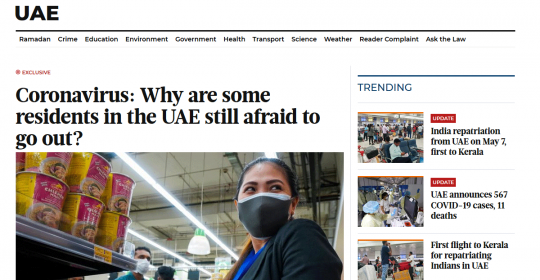
Coronavirus: Why are some residents in the UAE still afraid to go out? Dubai Psychologist, Dr. Fabian, in Gulf News
Najma is a 53-year-old housewife living in Downtown, Dubai. The easing of movement restrictions from April 24 has not changed the way she buys her groceries. Ever since the outbreak of coronavirus, she stopped going to her usual hypermarket in Karama, and instead has been making a weekly trip to the supermarket in her own building.
Even so, she says, “Buying groceries has become an expedition these days.”
Ask her why and she explains how it is a tedious, long-drawn process.
“Just the thought of all that I have to do puts me off – get into an old dress and pair of shoes, put on a mask, wear those rubbery gloves, carry two tissues to press the elevator button and worry sick about who I could bump into. Of course, the shopping comes with its own set of bizarre demands and when I get back, the drill is worse – having to deal with all that gear, clean the stuff that’s been bought, sanitise the packets and surfaces … seriously, the tasks are just endless. That’s why I hate stepping out of the house nowadays, but won’t order online either as I don’t want strangers coming to my doorstep.” […]
To fight or take flight, approach or avoid?
Preventive care or paranoia, whichever way you look it, there are any number of UAE residents out there who are not ready to venture out of their homes still, and if they have no choice, will do whatever it takes – and more – to protect themselves from the virus.
He says, “Evolutionarily speaking, our brains have been developed for adaptation to the environment in order to ensure our survival, and when confronted with uncertainty, respond with what is called the fight-or-flight reaction, which can also be termed as approach-avoid reaction. Whether to actively engage with the situation (approach, fight) or passively submit to the situation (avoid, flight) depends on the way we interpret ourselves versus the environment. These interpretations in turn are derived through our genetics and our experiences. Now stored in memory, they consciously as well as unconsciously drive our behaviour when confronted with uncertain or unsafe stimuli.”
A question of regaining liberties, trust
The psychologists say exercising caution with a sense of balance is the key.
They say people should not over-estimate their sense of safety just because some restrictions have been lifted. “The danger – the virus – is still as unpredictable and invisible as it was before, so precautions such as mask/gloves and social distancing are still valid, as well as “crowd control”. Certain practices of hygiene (like regularly washing hands with water and soap) should have been integrated into our normal habits anyways. Just stick to the rules and you’ll be fine,” says Dr Sarloos.
Activities that we took for granted earlier have now become more significant
“Nevertheless, with regard to going out, for what it’s worth, people should enjoy the regained liberties after having learnt its value during the stay-in. So despite not going to festivals, just having a stroll through the park or walking along the beach, activities which we may have taken for granted before now have become more significant and thus should be consciously enjoyed as such. As we slowly regain our trust in the environment, but also realise our personal sense of control (and self-confidence) in dealing with the crisis and the virus, and one another too, we will adapt and survive. Also, people should be more aware and proud of the value of society, as the UAE and its residents have done a great job in coping and continuing to deal with the crisis,” he adds.
The full and original article was published in Gulf News

